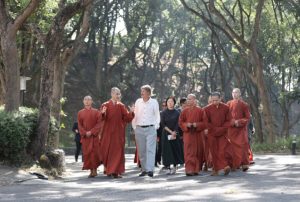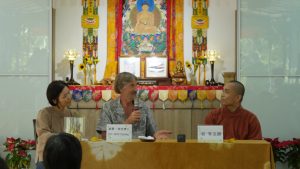Searching for Western Wisdom Teachings
Dr. Will Tuttle
 Having just returned from a four-week lecture tour through east Asia, I am struck by some basic differences between Eastern and Western culture that seem significant for the vegan movement. One of the most compelling differences is in the relationship between a culture’s vegan movement and its ancient wisdom teachings.
Having just returned from a four-week lecture tour through east Asia, I am struck by some basic differences between Eastern and Western culture that seem significant for the vegan movement. One of the most compelling differences is in the relationship between a culture’s vegan movement and its ancient wisdom teachings.
We were inspired by the remarkable progress being made by the vegan movement in east Asia due to its being propelled forward by the efforts of Buddhist and other traditional spiritual and religious groups. These groups are working to encourage more conscious and compassionate eating and consuming habits among their rapidly expanding memberships, and also among the general population. Two of the Buddhist movements in Taiwan we worked with, for example, Tzu Chi and Bliss & Wisdom—each with many hundreds of thousands of devotees—actively promote both vegetarian and vegan living through their schools, universities, hospitals, lay and monastic trainings, farms, sanctuaries, disaster relief efforts, recycling and environmental remediation projects, and other educational and cultural programs. This is also true of many other Buddhist groups in Asia, as well as for other faith traditions, such as Confucian, Taoist, Jain, and many strands of the Hindu tradition like yoga and Advaita Vedanta. These traditions typically encourage their adherents to refrain from eating animal flesh, and increasingly to abstain from all animal-sourced foods and products because of their traditional scriptural teachings.
 The ancient instruction of ahimsa (nonharmfulness), for example, goes back untold thousands of years, and is a core teaching in Buddhist, Jain, and Hindu traditions. Ahimsa is the essence of veganism: to minimize harming others for one’s own benefit, and it is also strongly present in Confucian and Taoist teachings that encourage humility, kindness, and respect for others, and harmony with nature. In all these traditions, animals are explicitly included within the sphere of moral concern. In most of Asia, if someone is a vegan or vegetarian, it is assumed that it is because they are following a religious movement that teaches this.
The ancient instruction of ahimsa (nonharmfulness), for example, goes back untold thousands of years, and is a core teaching in Buddhist, Jain, and Hindu traditions. Ahimsa is the essence of veganism: to minimize harming others for one’s own benefit, and it is also strongly present in Confucian and Taoist teachings that encourage humility, kindness, and respect for others, and harmony with nature. In all these traditions, animals are explicitly included within the sphere of moral concern. In most of Asia, if someone is a vegan or vegetarian, it is assumed that it is because they are following a religious movement that teaches this.
In the West, the vegan movement seems to lack this essential foundation of respected ancient wisdom teachings that strongly encourage vegan living. Western religious traditions are for the most part dismissive and unsupportive of veganism, and in many cases even staunchly oppose it in practice, with church barbecues, halal and kosher slaughter, and the teaching that humans are so qualitatively superior to animals that it renders our ongoing abuse of them for food and other uses to be of little ethical consequence.
 So, veganism in the West is often anti-religious and even anti-spiritual, and also tends to be pro-atheist and pro-materialist in an attempt to escape the disheartening support of animal abuse promoted by both ancient and contemporary Western religious teachings. Thus, in the West, veganism is seen as an evolution into a new way of being, and in the East, it’s seen more as a return to the wisdom of the ancestors. Ironically, it has been the successive invasions of the East by Western herding cultures over the millennia that have helped cause them to start herding and eating animals, and to increase meat and dairy consumption in recent years, but their memory of the pre-herding spiritual awareness of respect for all life seems to be more intact there than in the West.
So, veganism in the West is often anti-religious and even anti-spiritual, and also tends to be pro-atheist and pro-materialist in an attempt to escape the disheartening support of animal abuse promoted by both ancient and contemporary Western religious teachings. Thus, in the West, veganism is seen as an evolution into a new way of being, and in the East, it’s seen more as a return to the wisdom of the ancestors. Ironically, it has been the successive invasions of the East by Western herding cultures over the millennia that have helped cause them to start herding and eating animals, and to increase meat and dairy consumption in recent years, but their memory of the pre-herding spiritual awareness of respect for all life seems to be more intact there than in the West.
 As I discuss in The World Peace Diet, the Abrahamic monotheistic religions that co-evolved with the herderism of Western culture all tend to support the warlike, patriarchal, and animal- and nature-dominating orientation of Western culture, still organized at its core around herding animals for food. These Judaic, Christian, and Islamic religions, being monotheistic, have also all historically been aggressive in their efforts to convert people to their religion and their “one true God.”
As I discuss in The World Peace Diet, the Abrahamic monotheistic religions that co-evolved with the herderism of Western culture all tend to support the warlike, patriarchal, and animal- and nature-dominating orientation of Western culture, still organized at its core around herding animals for food. These Judaic, Christian, and Islamic religions, being monotheistic, have also all historically been aggressive in their efforts to convert people to their religion and their “one true God.”
In contrast, there is no concept of a “one true God” in Buddhist, Jain, Taoist, Confucian, and Hindu traditions, and thus little compulsion to proselytize, which can be its own form of violence. These non-theistic Eastern traditions emphasize self-cultivation, spiritual awakening, harmony with others and nature, and are inclusive in their orientation. However, they are decidedly not atheistic or materialistic. In contrast, the West’s violence toward animals has produced its two main ideologies, authoritarian and bellicose monotheisms on one hand, and reductionistic atheistic materialisms on the other. There seems to be little authentic spirituality in either of these, or support for vegan living either.
 So, do we in the West have any ancient wisdom teachings to which we can turn, like the East can, to nurture our yearnings for religious and spiritual sustenance that strongly supports vegan living? Unfortunately, there seems to be little in the West that approaches in scope or depth the vast and profound repositories of spiritual wisdom of the Eastern traditions. For example, we visited a vegan school in Taiwan where the students study the ancient Buddhist Lamrim and Avatamsaka and Prajnaparamita Sutras, and the Analects of Confucius. These voluminous teachings call for altruism, harmony with nature and animals, respect for elders, daily meditative reflection, understanding life and consciousness as eternal, and the Bodhisattva ideal of dedicating one’s life to the welfare and liberation of all beings. They provide a powerful support for the students in their vegan lifestyles: their meals, their work in the organic vegetable gardens, and their relationships with others.
So, do we in the West have any ancient wisdom teachings to which we can turn, like the East can, to nurture our yearnings for religious and spiritual sustenance that strongly supports vegan living? Unfortunately, there seems to be little in the West that approaches in scope or depth the vast and profound repositories of spiritual wisdom of the Eastern traditions. For example, we visited a vegan school in Taiwan where the students study the ancient Buddhist Lamrim and Avatamsaka and Prajnaparamita Sutras, and the Analects of Confucius. These voluminous teachings call for altruism, harmony with nature and animals, respect for elders, daily meditative reflection, understanding life and consciousness as eternal, and the Bodhisattva ideal of dedicating one’s life to the welfare and liberation of all beings. They provide a powerful support for the students in their vegan lifestyles: their meals, their work in the organic vegetable gardens, and their relationships with others.
 To bring this kind of education to the West, I find myself searching for comparable ancient traditions and teachings that could support and deepen vegan living here. While it seems best to mainly leave it as an open question for our culture and movement to address, we can immediately see that there are several helpful passages in the Old Testament (though much also that is opposed), and in the New Testament also, in the teachings of Jesus. There is a core instruction of mercy and respect for others and for God’s creation that could potentially support vegan living. There are also some positive teachings in the Koran and the Islamic tradition that encourage kindness to animals. Additionally, there are the teachings of Pythagoras, unfortunately mostly lost, as well as some of the pre-Socratics. Plutarch, Plotinus, and the stoicism of Marcus Aurelius are potentially helpful. The Orthodox tradition also has many stories of pious monks who befriended and didn’t eat or harm animals. According to some scholars, the earliest Christians were well-known to their contemporaries to refrain from meat and wine, and even wool, to refuse participation in war and slavery, and to advocate vegan ideals as well as the removal of the passages in the Torah that promote violence toward animals and humans. Perhaps the ancient Essene communities harbor wisdom teachings that can be a foundation for Western vegan culture.
To bring this kind of education to the West, I find myself searching for comparable ancient traditions and teachings that could support and deepen vegan living here. While it seems best to mainly leave it as an open question for our culture and movement to address, we can immediately see that there are several helpful passages in the Old Testament (though much also that is opposed), and in the New Testament also, in the teachings of Jesus. There is a core instruction of mercy and respect for others and for God’s creation that could potentially support vegan living. There are also some positive teachings in the Koran and the Islamic tradition that encourage kindness to animals. Additionally, there are the teachings of Pythagoras, unfortunately mostly lost, as well as some of the pre-Socratics. Plutarch, Plotinus, and the stoicism of Marcus Aurelius are potentially helpful. The Orthodox tradition also has many stories of pious monks who befriended and didn’t eat or harm animals. According to some scholars, the earliest Christians were well-known to their contemporaries to refrain from meat and wine, and even wool, to refuse participation in war and slavery, and to advocate vegan ideals as well as the removal of the passages in the Torah that promote violence toward animals and humans. Perhaps the ancient Essene communities harbor wisdom teachings that can be a foundation for Western vegan culture.
 Otherwise, we in the West can also certainly study and benefit from the Eastern scriptures and other non-Western teachings because they are part of our human heritage. And finally, we can do our best to create the new vegan and spiritual traditions and writings that may someday be the ancient wisdom teachings of future generations.
Otherwise, we in the West can also certainly study and benefit from the Eastern scriptures and other non-Western teachings because they are part of our human heritage. And finally, we can do our best to create the new vegan and spiritual traditions and writings that may someday be the ancient wisdom teachings of future generations.
 If you have further suggestions or ideas, please post in the comments below – thanks! Click here to see our short video of the lecture tour highlights.
If you have further suggestions or ideas, please post in the comments below – thanks! Click here to see our short video of the lecture tour highlights.
(There is a German translation of this essay also, thanks to Stefan Wolf.)